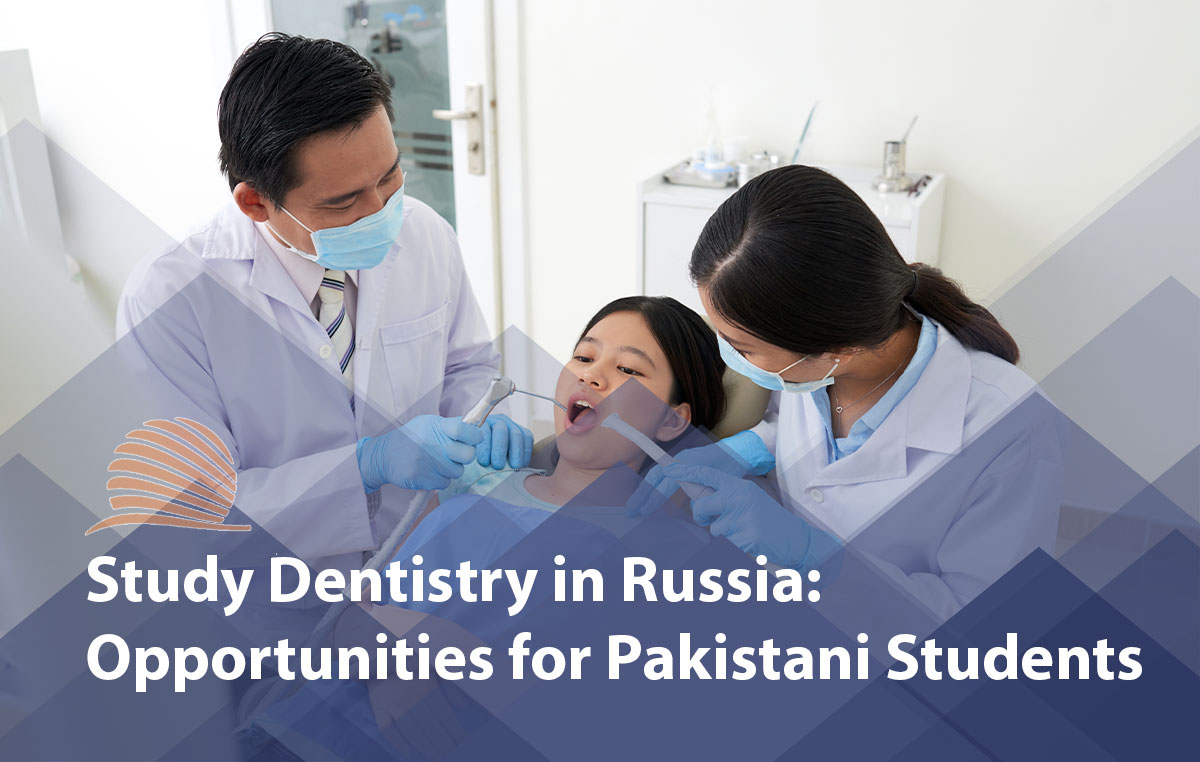Dentistry in Russia

Study abroad expert advice
Don't waste time! just fill the form to get help.
Russia provides affordable, high‑quality Bachelor of Dental Surgery (BDS) programs taught in English (and sometimes Russian). These are WHO and PMC-recognized degrees, typically five years long, often including a one-year clinical internship. Tuition is significantly lower compared to private institutes in Pakistan.
Why Study in Russia
- Low tuition & living costs: Annual tuition ranges from USD 3,000 to 11,800, with living expenses around USD 2,000–5,000 per year.
- No entrance tests: Admission often requires only pre‑medical FSc ≥ 50–60%, and no MDCAT/NEET for Pakistani students.
- English medium programs: Many universities offer dentistry entirely in English, with optional Russian support for clinical years.
- Global recognition: Degrees accepted by WHO, PMC, ECFMG; eligible for licensing exams worldwide.
- Multicultural experience: Over 3,000 Pakistani and international students study across various regions in Russia.
Top Universities
| University | City | Approx. Annual Tuition (USD) | English Program |
| Sechenov First Moscow State Medical University | Moscow | ~11,800 | Yes |
| Kazan Federal University (Dental faculty) | Kazan | ~3,268–5,300 | Yes |
| Lobachevsky University | Nizhny Novgorod | ~3,864 | Yes |
| Astrakhan State Medical University | Astrakhan | ~4,020 | Yes |
| Dagestan State Medical University | Makhachkala | ~5,000 (approx) | Yes |
Admission Requirements & Process
- Academic: FSc Pre‑Medical with ≥ 50–60% marks in Biology, Chemistry, Physics; no entry tests for Pakistani nationals.
- Language: IELTS/TOEFL may be required for English programs (scores around IELTS 5.5–6.0 or TOEFL iBT 70–90), though sometimes waived.
- Documents: Filled application form, academic transcripts, passport, passport-size photos, medical/HIV certificate, financial proof, police clearance (if needed).
- Timeline: Most dental intakes begin in September; candidates apply by August. Universities issue admission or invitation letters; invitation is used to apply for student visa.
Estimated Expense
- Tuition: USD 3,000–11,800/year, depending on university and city.
- Accommodation & Living: USD 2,400–6,000/year for hostel; food, transport, insurance and supplies total USD 6,000–7,500/year.
- Total Estimated Annual Cost: USD 6,000–12,000. In PKR, roughly PKR 1.2–2.5 million/year depending on currency
Visa Requirements
Pakistani applicants require:
- Valid passport (min. 16–18 months validity)
- Official invitation/student admission letter
- Completed visa application, visa support form
- Academic document copies (notarized translations), photos
- Medical certificate including HIV test, health insurance
- Proof of funds, police clearance (if requested).
Processing typically takes 2–6 weeks. Universities usually assist with invitation letters.
Scholarships for Pakistani Students
- Russian Government Scholarships: Fully funded (tuition + dormitory), awarded via competition or nomination, typically applicable to students with high academic merit.
- University-based merit awards: Some institutions offer partial tuition waivers or scholarships for top applicants.
- International exchange or bilateral programs: Limited spots sometimes available for Pakistani students via cultural or education agreements.
- Private / agent scholarships: Platforms like Gscholar offer a 20% first‑year tuition discount for registered applicants.
FAQs
How long is BDS in Russia?
The BDS program typically spans 5 years, excluding optional 1-year clinical internship.
Do I need IELTS/TOEFL or MDCAT?
IELTS/TOEFL may be needed for some English programs (scores ~5.5–6). MDCAT is not required for admission, but PMC requires passing their screening test after degree verification.
Is knowing Russian mandatory?
Not initially, but most clinical rotations involve patient interaction in Russian. Many universities offer free first‑year Russian language courses.
Will the BDS degree be accepted in Pakistan?
Yes, if the university is listed by WHO and PMC and you pass PMC’s foreign degree verification and screening test. Registration begins with provisional license, then house job and NRE → full license.
How’s the clinical training quality?
Clinical training is structured with hands‑on hospital exposure; Russian dental degrees are recognized globally, although some countries require additional qualification for licensure.

 Scholarships 2026 – Fully Funded Oxford Degrees (5).jpg)
 Scholarships 2026 – Fully Funded Oxford Degrees (4).jpg)
 Scholarships 2026 – Fully Funded Oxford Degrees (3).jpg)
 Scholarships 2026 – Fully Funded Oxford Degrees (2).jpg)